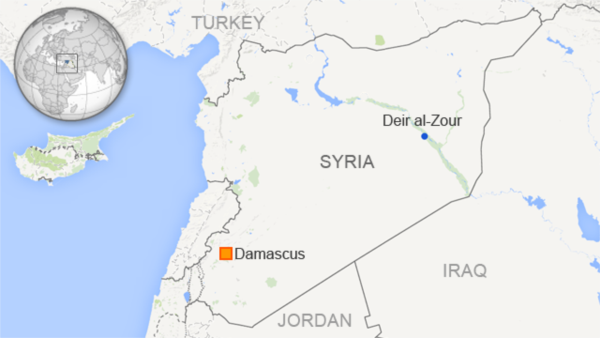Syria’s foreign minister said his country is ready to participate in peace talks in Geneva, “without any foreign interference,” nearly a week after the United Nations Security Council approved a plan for an international Syrian peace process aimed at ending its civil war.
Foreign Minister Walid Muallem made the comments to reporters following a meeting in Beijing with his Chinese counterpart, Wang Yi.
Muallem said the Syrian delegation will be ready as soon as it receives a list of the members of the opposition’s delegation.
He added that the government hopes the dialogue will be successful in helping Syria establish a national unity government.
‘Foreign interference’
Muallem did not explain what he meant by “foreign interference.”

China’s Foreign Minister Wang Yi, right, speaks at a press briefing with Syria’s Foreign Minister Walid al-Moallem at China’s Ministry of Foreign Affairs in Beijing, Dec. 24, 2015.
China is on the U.N. Security Council that approved the peace roadmap last week. Talks could begin as soon as January.
Elsewhere Thursday, the Islamic State group seized a district previously held by Syrian government forces in the city of Deir el-Zour, expanding its presence in the contested region following heavy clashes with troops holed up inside, the extremist group and Syrian opposition activists told The Associated Press.
The IS-affiliated Aamaq news agency said the industrial district of fell to the group late Wednesday following daylong clashes that began with three successive suicide operations carried out by the militants on Syrian army outposts inside.

Aamaq said at least 38 Syrian troops were killed in the attack during which the group seized large amounts of ammunition and an armed personnel carrier from the government troops.
The Britain-based Syrian Observatory for Human Rights also reported the IS capture of the district, saying at least 26 soldiers were killed.
Syrian roadmap
On Friday, U.S. Secretary of State John Kerry called the international roadmap a rare display of unity among major powers on a conflict that has claimed more than a quarter-million lives.
Kerry praised “the unprecedented degree of unity” in the council, which previously has been stymied in finding a political solution in Syria. He called Friday’s agreement “a milestone,” and predicted the diplomatic effort will move forward quickly in the new year.
Turkey said the U.N. resolution is a positive step toward resolving the lengthy and costly civil war.

FILE – A gathering in the U.N. Security Council of foreign ministers lead by U.S. Secretary of State John Kerry vote on a draft resolution concerning Syria, at U.N. headquarters, Dec. 18, 2015.
Separately, however, Russian President Vladimir Putin said Saturday that his country has not yet used all of its military capabilities in Syria, and is ready to step up its involvement there if necessary.
The U.N. resolution expresses support for a Syrian-led political process facilitated by the United Nations. It calls for intra-Syrian peace talks and sets a target of six months for establishing a transitional government, followed by elections within 18 months.
The U.N. resolution, and the peace plan drafted by the United States, Russia and 18 other countries working together on the Syrian crisis, do not mention the future of Syrian President Bashar al-Assad.
Western countries have called for his departure, but Russia and China say he should not be required to leave power as a precondition for peace talks.
Civil war death toll
More than 250,000 people have died since the Assad government’s crackdown on political protests turned into a full-blown civil war in 2011.

FILE – Civil defense members search for survivors at a site hit Dec. 20 by what activists said were airstrikes carried out by the Russian air force in Idlib city, Syria, Dec. 21, 2015.
More than half of Syria’s entire prewar population has been uprooted by the war – families that either have fled abroad as refugees or are displaced internally, driven from their homes by violence.
Hundreds of thousands of Syrians have made the dangerous and often deadly journey across the Mediterranean into Europe this year.
Russia has launched hundreds of airstrikes in Syria since September, ostensibly targeting Islamic State forces, but it has become clear that Russia’s bombs are pounding other Syrian rebel groups and, in some cases, civilian areas.
Western governments and military analysts say Russia appears to place a much higher priority on preserving the government of Assad, Russia’s longtime ally, than on the extremists the U.S. and its allies are targeting.





